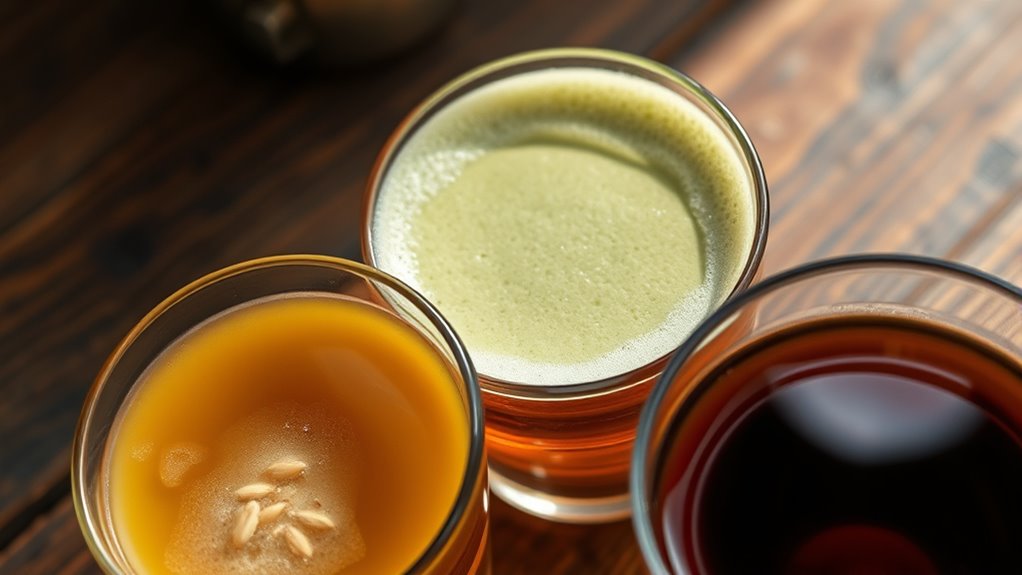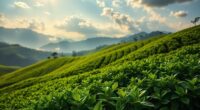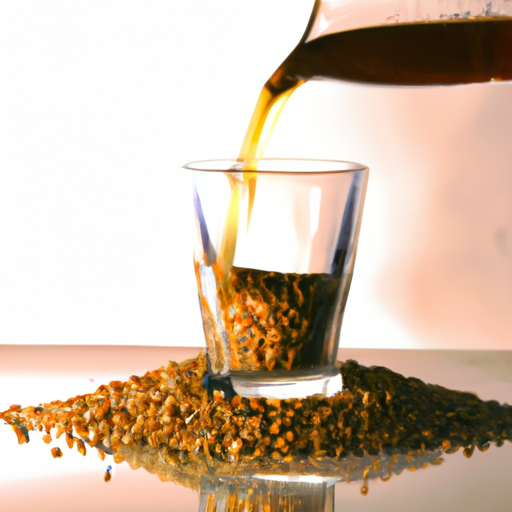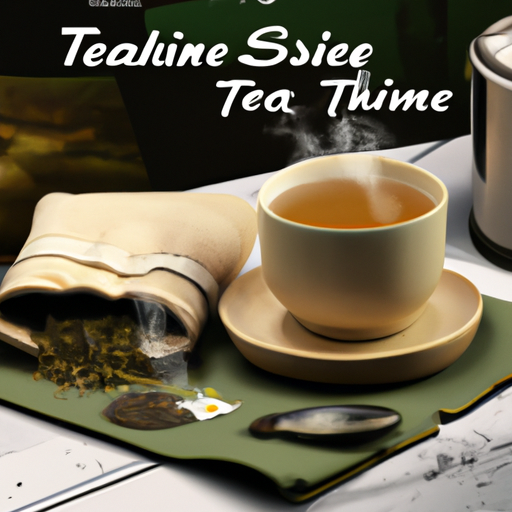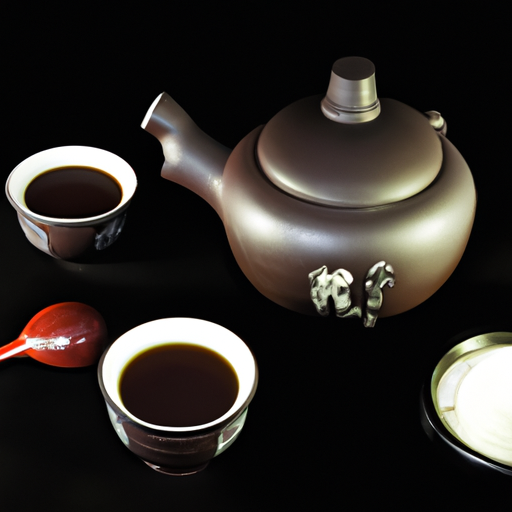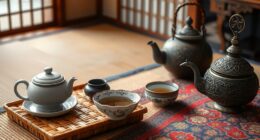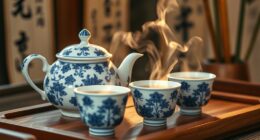Barley tea has a mild, nutty flavor with a roasted undertone, making it a soothing alternative to green or black tea, which can be more grassy or robust and contain caffeine. It offers health benefits like aiding digestion and lowering cholesterol, all while being caffeine-free. Unlike herbal teas, which vary widely in flavor and effects, barley tea provides a gentle, versatile option suitable hot or iced. Keep exploring to discover how it compares even further with other popular varieties.
Key Takeaways
- Barley tea is caffeine-free with a mild, nutty flavor, unlike green or black teas which contain caffeine and have more pronounced flavors.
- It offers gentle health benefits like digestion support and cholesterol reduction, similar to herbal teas, but with a unique roasted, toasty taste.
- Compared to green tea, barley tea has lower antioxidant levels but is less astringent and more soothing.
- Unlike black tea, barley tea has less caffeine and a softer flavor, making it suitable for sensitive palates and evening consumption.
- Its versatility as a hot or iced beverage pairs well with various foods, similar to herbal teas, but with a distinct nutty flavor profile.
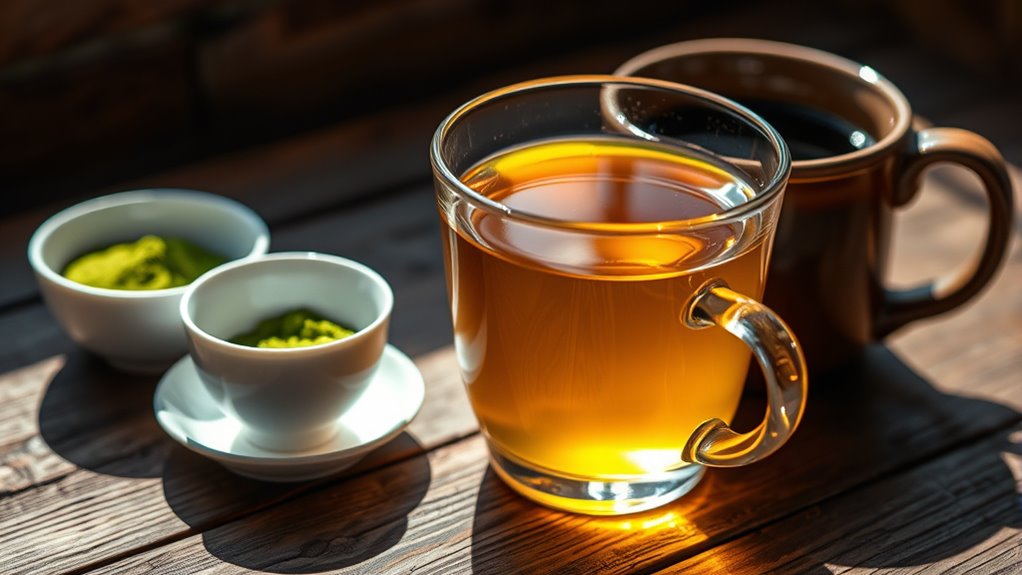
When choosing a tea, it’s helpful to understand how barley tea stacks up against other popular options. Barley tea offers a unique set of health benefits and flavor profiles that make it stand out among the many teas available. Unlike green or black tea, which are rich in antioxidants and caffeine, barley tea is naturally caffeine-free, making it an excellent choice if you want to reduce your intake of stimulants. Its health benefits extend beyond just caffeine content; barley tea is known for aiding digestion, helping to lower cholesterol, and providing antioxidants that support overall health. These properties make it a gentle yet effective beverage that contributes positively to your wellness routine.
Barley tea is a caffeine-free, health-boosting beverage with a mild, nutty flavor perfect for wellness routines.
In terms of flavor profiles, barley tea has a mild, nutty taste with a subtle roasted undertone. It’s often described as having a toasty, slightly sweet flavor that’s both comforting and revitalizing. This makes it versatile—perfect hot during colder months or iced when the weather warms up. Compared to green tea, which tends to have grassy, vegetal notes, or black tea, which offers robust, malty flavors, barley tea’s smooth, nutty profile tends to be easier on your palate. Many people find it less astringent and more soothing, especially if they’re sensitive to the bitterness sometimes found in other teas. Its mellow flavor also pairs well with a variety of foods, making it a flexible choice for different meals or snack times.
When weighing barley tea against other teas, consider not just the flavor but also the health benefits. Green tea, for example, is celebrated for its high antioxidant levels and potential metabolism-boosting effects, but it contains caffeine, which might not suit everyone. Black tea provides a stronger flavor and more caffeine, which can be energizing but might interfere with sleep if consumed late. Herbal teas, like chamomile or peppermint, are caffeine-free and often used for relaxation, but their health benefits vary widely depending on the blend. Barley tea, with its gentle, nutty flavor and multiple health benefits, offers a balanced alternative—less bitter than some teas, caffeine-free, and packed with nutrients beneficial to your health. Additionally, selecting teas with high antioxidant content can further support your overall wellness.
Ultimately, choosing barley tea depends on what you prioritize: a soothing, caffeine-free drink with a mild, roasted flavor, or perhaps a more robust tea with specific health benefits. Its unique combination of flavor profile and health perks makes it a compelling option for anyone looking to diversify their tea routine while supporting their well-being.
Frequently Asked Questions
Is Barley Tea Caffeine-Free?
Yes, barley tea is caffeine-free. You won’t find any caffeine content in barley tea, making it a great choice if you’re sensitive to caffeine or want to avoid it. Unlike other teas that contain tea caffeine, barley tea is naturally free of caffeine, so you can enjoy it anytime without worrying about stimulating effects. It’s a calming, flavorful beverage perfect for relaxing or winding down.
How Does Barley Tea Affect Hydration?
Did you know barley tea is naturally hydrating? It offers notable hydration benefits because it contains electrolytes that help maintain fluid balance. Drinking barley tea can replenish lost electrolytes, making it a great choice after exercise or on hot days. Its caffeine-free nature also means it supports hydration without the diuretic effects of caffeinated beverages, so you stay refreshed and properly hydrated longer.
Can Barley Tea Be Consumed During Fasting?
Yes, you can drink barley tea during fasting because it’s calorie-free and helps you stay hydrated. Its low calorie content means it won’t break your fast, allowing you to enjoy fasting benefits like improved digestion and mental clarity. Plus, drinking barley tea can curb hunger and boost hydration, making it a great choice while fasting. Just make certain it’s unsweetened to avoid added calories.
Does Barley Tea Have Any Known Health Risks?
Barley tea is generally a gentle giant in your cup, offering health benefits like antioxidants and hydration. However, watch out for potential drawbacks—some might experience bloating or allergic reactions. While rare, excessive consumption could lead to nutrient imbalances. You should enjoy it in moderation, listening to your body’s signals, so it remains a friendly companion rather than a hidden troublemaker on your health journey.
What Are the Best Brewing Methods for Barley Tea?
To brew barley tea perfectly, start with a brewing temperature of about 200°F (93°C). Use 1 to 2 tablespoons of roasted barley per cup. Steep the grains for 5 to 10 minutes, depending on how strong you like it. Keep a close eye on the steeping duration to avoid bitterness. Once done, strain out the barley, and enjoy your warm or chilled beverage.
Conclusion
When comparing barley tea to other teas, you’ll find each has its unique charm. Whether you prefer the nutty richness or the delicate floral notes, there’s something for everyone. Remember, variety is the spice of life, so don’t hesitate to explore different options. Each sip offers a new experience, and you might just find your new favorite. So, keep an open mind and enjoy the journey—after all, the proof is in the pudding.

